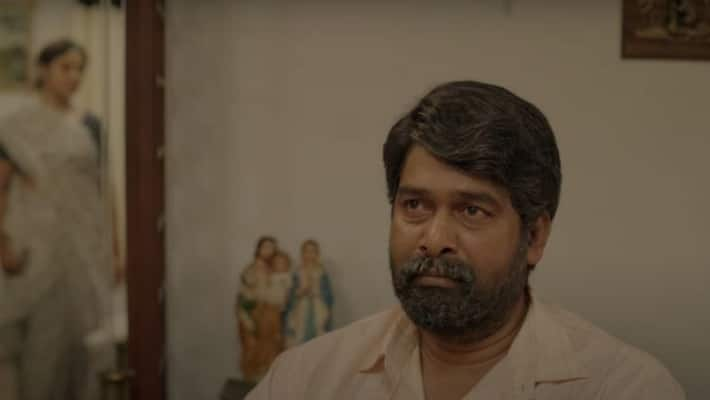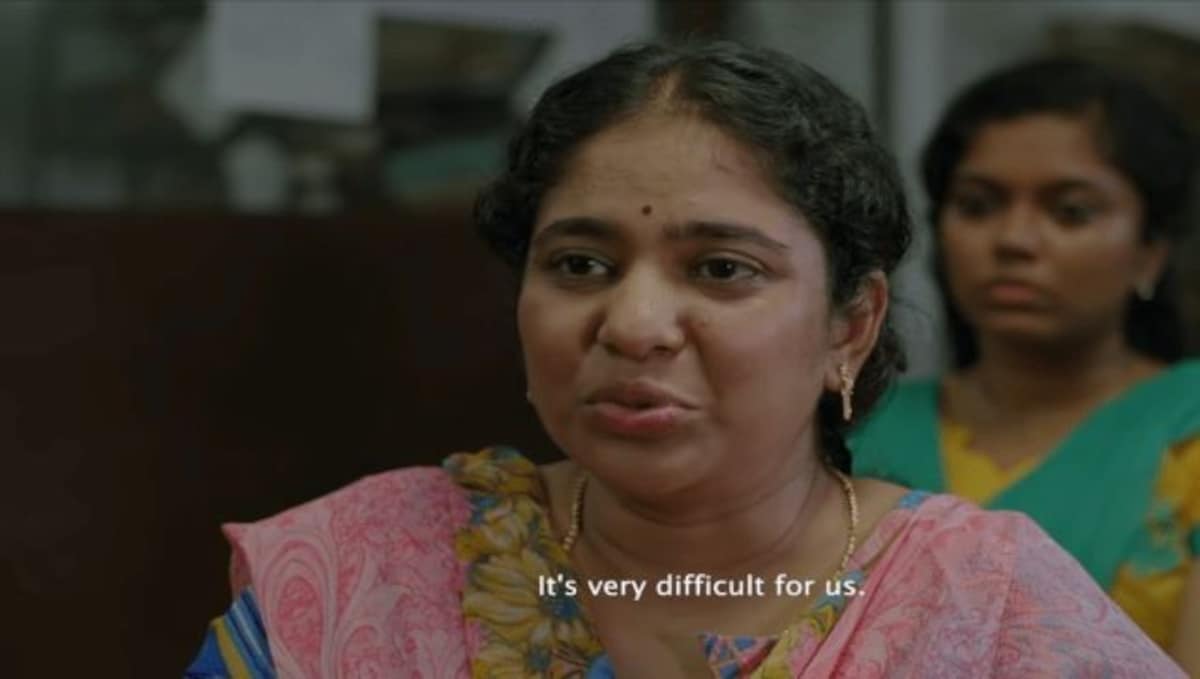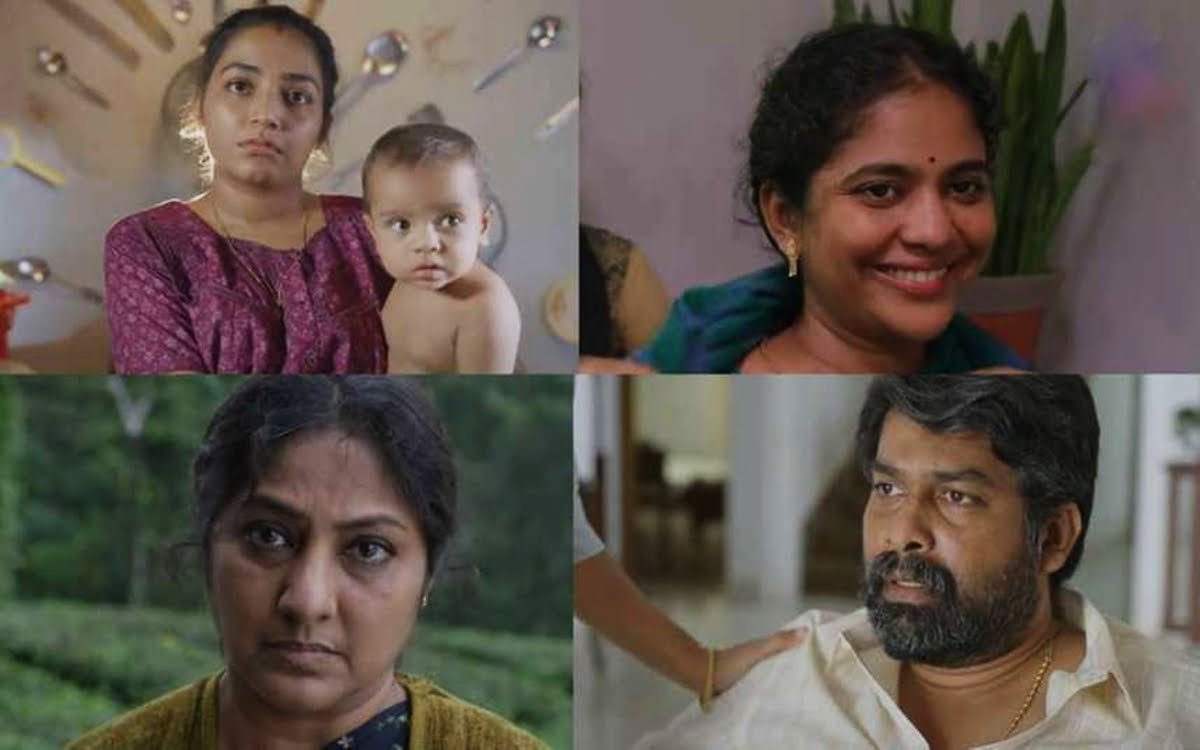Anthology films tend to be alienating experiences for audiences who have normalised experiencing typical narrative structures of feature films. The inability to stay with a singular plot or characters often feels counterproductive to the escapist experience mainstream audiences expect from cinema. Freedom Fight (2022) is one such anthology collectively directed by Jeo Baby, Jithin Issac Thomas, Akhil Anilkumar, Kunjila Mascillamani and Francies Louis that forcefully grounds its audience and calls them to action. To claim that the film’s focal intention was to make audiences feel suffocated, filthy, guilty and above all accountable would not be far-fetched. Freedom Fight seams together five narratives distinct in setting, plot and characters but united under a central theme — freedom.
The inability to stay with a singular plot or characters often feels counterproductive to the escapist experience mainstream audiences expect from cinema. Freedom Fight (2022) is one such anthology collectively directed by Jeo Baby, Jithin Issac Thomas, Akhil Anilkumar, Kunjila Mascillamani and Francies Louis that forcefully grounds its audience and calls them to action.
The ‘freedom fight’ the film deals with, contrary to the use of violence or unrest, is modernised to resonate with the moralistic war society participates in, in everyday life. This fight for freedom comes from the rebellion within the mind against societal prisons of judgement, hegemony and institutionalism. It echoes Michel Foucalt’s criticism of surveillance through the panopticon prison (Discipline and Punish, 1975). A panopticon prison was designed by Jeremy Benthem with the intention to punish and reform prisoners through its structure which allows constant surveillance by security guards, thus denying a sense of privacy or personal space and a subjugation of continuous ‘looked-at-ness’. Foucault believed that power and knowledge came from observing the other. Likewise, members of society today have socially conditioned views of the other and tend to follow codified morals often framed by those in power. These views are imposed on the other, creating a rigid hegemonic structure, which, if diverged in any way, may lead to social alienation. These are the scenarios contextualised and rebelled against in the various stories of Freedom Fight.
Also read: ‘Pushpa’ Film Review: The Problematics In The Making Of A Hypermasculine Hero
The first story, Geethu Unchained (a possible nod to Tarantino’s Django Unchained (2012)) by Akhil Anilkumar, depicts the social constructions that has suffocated and imprisoned Geethu. She is an employed woman for whom all life decisions are made for by the people around her. Her mother nags her about her clothes and constantly surveys her whereabouts. Her elder brother wants her to marry as quickly as possible in order to acquire ‘societal sanction’ to get married himself. When she tries to voice her opinions against her oppression, her father tries to shut her down, stating the neighbours will hear them squabble. Her co-worker is constantly in her ears voicing opinions Geethu never asked for. She is forced to subjugate herself to all of this because of her mistake in deciding to marry someone she loved and then later turning down the marriage.

The narrative shown seems to imply that her family ‘gave’ the ‘educated girl’ a chance to decide for herself, but she ultimately failed. Geethu thus becomes imprisoned in the panopticon, subject to judgement and opinions from all sides, which drowns her own voice. This very idea of “what will the neighbours/society think” that her dad brings up recurrently is the self-imposed panopticon that Anilkumar seems to be suggesting that society is a victim to. Geethu only finds an outlet to voice her frustration through the strangers she meets in her daily life. Perhaps it is the freedom from judgement that allows her this. Ironically enough, it is the collective of these strangers labelled “society” that her family wants to please through the domestication of Geethu.
On similar lines, this panopticon of “what others may think” also plagues the other short films, Old Age Home by Jeo Baby and Ration by Francies Lois in Freedom Fight. In Old Age Home, the three central characters are imprisoned themselves. Baby is unable to freely navigate himself or eat whatever he likes as an indirect result of his partial dementia. Lali directly points out to her children how she had to sacrifice her freedom for theirs and her husband’s sake. She is still unable to conveniently partake in her jackfruit chips business as she has to take care of Baby. In the middle of these freedom struggles comes Dhanu, who is robbed of choice as she has to listen to her employer, Lali, but at the same time tend to the wants of Baby. She is forced to make decisions in situations where the options she is given are problematic one way or the other and ultimately is penalised for a circumstantial decision she had no role in taking. Here too, it was the children of Baby and Lali who act as the panopticon security guards who attempt to ‘reform’ their parents by pointing out “what others will think” when they see Baby at a bar and command their mother that her only responsibility is to take care of their father.

In Ration, Lois shows us the class divide prevalent in society through the experience of Sumi, who is forced to scavenge for seer fish around town and ultimately sell her ring to buy it in order to prevent an altercation with their neighbouring family. The class divide becomes evident through the juxtaposition of the abundance that the rich have (which they are shown to waste) and the depravity of the poor showcased by the selling of a gold ring to buy fish. This same class divide also breeds shame within Sumi even though she is familiar with Princy, preventing Sumi from having an arbitrary conversation that could’ve saved her the time, effort and money of buying a seer fish or selling her ring. Here again we see the “what will others think” narrative come into fruition as a result of class divide and the ensuing shame it results in. While these three films show the narrowed existence the panoptic forces on individuals, the remaining two have strongholds of collective rebellion that attempt to deconstruct the panopticon.
EDUCATE. AGITATE. ORGANISE — The identification, development and execution of this famous slogan, recitation by the likes of B.R. Ambedkar, for just compensation and remuneration seems to be what the other two shorts in Freedom Fight suggest. While the previously mentioned films all center individuals cornered by the panoptic prison, Kunjila Mascillamani’s Asanghadithar and Jithin Isacc Thomas’ Pra.Thoo.Mu situate themselves around the collective. Both emphasise the efficiency and necessity of organised and informed rebellion instead of reactionary methods.
Also read: Film Review: Sara’s — A Refreshing Take On The Deification Of Motherhood

In Asanghadithar, women labourers working in shops within a commercial township are neglected of public toilets even as the law demands that every shop has one. When confronting labour unions to voice their concerns and identify solutions, they are repudiated by the argument that it is not an employer-worker issue. It has to be noted that all bodies of power (shop owners, labour union leaders and even the collector) are masculine and therefore obviously show a lack of regard for women’s issues. Mascillamani courts a need for women to educate themselves and form a recognised collective to counter the patriarchal forces that prioritise exploitative capitalist mentality.
The short is also critical of the mainstream arbitrary anti-feminist argument that women earn lower than men because they do not work the jobs men do by contextualising how women are denied proper work environments to be productive in the first place. Additional to this argument, Mascillamani’s subtle hints to patriarchal control of femininity can be noted through references to churidars without pockets and intentional discrediting of the women’s collective formed with it ignorantly being addressed as ‘Pennkutti’ (Little girl) instead of ‘Pennkootu’ (Sisterhood). Additionally, Macillamani uses the docu-fiction approach in structuring the narrative as it provides an air of credibility and is an authentic approach in introducing audiences to real-world problems. The implemented E-toilet is a symbol of bureaucratic red tape that only produces half results. The inclusivity of the transgender persons further improve the stronghold of the rebellion, and an air of sisterhood is created to de-institutionalise the commercial space ruled over by men.
In the end, the shop owners collude and decide to make a single washroom for the female labourers in a feverous attempt to shut down the rebellion before it catches momentum and costs the shop owners even more. These are not corporate entities but small-scale businesses that survive on daily earnings. But Mascillamani, through her placement of the narrative in a small-scale setting with uneducated women who come together, educate themselves and then agitate, echoes popular Marxist feminist thinker Alexandra Kollontai’s ideals of the proletariat feminist who recognises liberation from capitalism as a long-term process and one that requires the collective rather than the individual feminist.
On similar lines, Pra.Thoo.Mu or Prejathipathik Thooran Muttunnu calls for attention to the plight of manual scavengers and the need for labourers to conduct organised disruption as opposed to reactionary responses in the pursuit of just reconciliation. It denounces the coloured world of the other shorts to present visually gruesome images that stay with viewers and acts as a metaphor for the greying of reality where right and wrong are indistinguishable from those in power and those not. Lakshmanan’s actions subvert his position in established power hierarchy as he, who hails from a professional considered inferior, enters the regal space of the vile authoritarian in rebellion but ultimately obtains no redressal. Thomas mocks his authoritarian leader by making him attack Lakshmanan with O. V. Vijayan’s book, Dharmapuranam (1987), a political satire that criticises capitalism and commodification. The novel may have inspired Thomas as it too has a “Prajathipathi” (ruler) and frequently used words like theetam (excreta) of the ruler.

Paralleling the organised rebellion of Asanghaditar, The All Kerala Septic Tank Cleaners Association declares that, “till we get justice, you can clean your tanks yourselves”. This can be understood as a message to both the characters within the domain of Pra.Thoo.Mu as well as a call to action for apolitical viewers who are very much part of the problem through their inertia which permeate the exploitative political environment that persists.
From the ice-cream cups that Geethu has in Geethu Unchained, seer fish that Sumi runs around town to acquire in Ration, ladoo and prasadam that Baby craves, to the piss and shit of the women in Asanghaditar and scavengers of Pra.Thoo.Mu, Freedom Fight is a reality check on the constructs imposed on passive members of society and the necessity of organised uprising in subverting hegemonic exploitative power structures that have corrupted the morality that actually matters.
From the ice-cream cups that Geethu has in Geethu Unchained, seer fish that Sumi runs around town to acquire in Ration, ladoo and prasadam that Baby craves, to the piss and shit of the women in Asanghaditar and scavengers of Pra.Thoo.Mu, Freedom Fight is a reality check on the constructs imposed on passive members of society and the necessity of organised uprising in subverting hegemonic exploitative power structures that have corrupted the morality that actually matters.
Krishnanunni P is currently pursuing his Master’s degree in Film and Literature from the University of York. He is an ardent fan of Football and Dance but also prefers to spend time immersed in Literature, Philosophy and Cinema. He is on a personal pilgrimage to tell the artistic stories of Malayalam Cinema. You can find him on Instagram and Twitter.
Featured image source: Mathrubhumi



